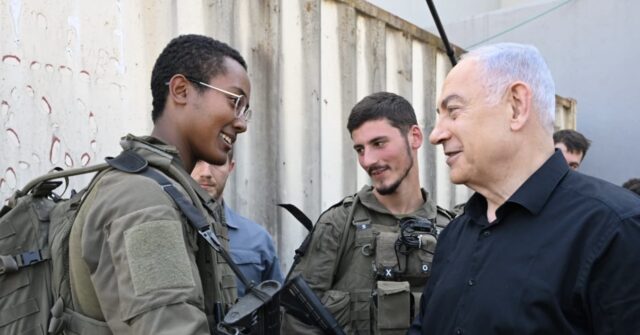Israeli Prime Minister Benjamin Netanyahu made a significant visit to Israeli Defense Forces (IDF) troops stationed along the northern border with Lebanon, emphasizing the ongoing confrontation with Hezbollah. The visit serves not only as a morale booster for the troops but also as a strategic evaluation of the military’s operations in southern Lebanon. During this visit, Netanyahu met with key military leaders, including Major General Ori Gordin, the head of Northern Command, and Brigadier General Moran Omer, commander of the 36th Division. The discussions centered around the current deployment of Israeli forces and the substantial operational achievements made against Hezbollah, an adversary that has been a persistent threat to Israeli communities.
Netanyahu’s statements during the visit highlighted the IDF’s ongoing tactical efforts to dismantle Hezbollah’s military capabilities. According to the Prime Minister’s Office, the briefing covered the progress made on the ground and the intense fire missions that have been instrumental in undermining Hezbollah’s infrastructure. The Prime Minister was informed about the extensive combat operations that the brigade commanders and their units have undertaken. His remarks underscore the IDF’s commitment to safeguarding Israeli communities from potential terrorist attacks. By commending the soldiers for their bravery and effectiveness, Netanyahu aimed to reinforce their resolve and confidence as they continue their mission.
In addressing the troops directly, Netanyahu expressed his admiration and gratitude, labeling them as “heroes” who are engaged in commendable actions against an entrenched enemy. He acknowledged the emotional weight of their sacrifices, especially following the substantial challenges faced by Israel in the past year. His remarks served to not only boost morale but also to frame the ongoing military campaign as a noteworthy effort in Israel’s defense history. Netanyahu’s declaration of being a part of a “generation of victory” is aimed at uniting the forces in their struggle and reinforcing a sense of purpose within the ranks as they confront ongoing threats.
The wider context of the Prime Minister’s visit involves the dire humanitarian consequences stemming from Hezbollah’s aggressive actions, which have led to the evacuation of over 60,000 residents in border villages. Major General Gordin’s personal visit to southern Lebanon the previous day reflects the gravity of the situation and the military’s commitment to its objectives. The pressures exerted by Hezbollah not only challenge military operations but also significantly impact civilian life and safety within Israeli borders. The presence of Netanyahu alongside military leadership aims to communicate government support for the soldiers, recognizing their role in mitigating these challenges on both a tactical and humanitarian front.
As Netanyahu outlines future objectives, his comments reflect a broader stance on Israel’s military strategy and ongoing confrontation with regional adversaries. His message accentuates the dual necessity of maintaining military readiness while addressing the complexities posed by Hezbollah’s operations. The notion of changing “the reality across the board” suggests an overarching strategy that not only seeks immediate tactical success but also aims to reposition Israel more favorably in its long-term security and geopolitical context.
This visit, and Netanyahu’s accompanying statements, come at a critical time, as the IDF continues to engage in a prolonged conflict against Hezbollah, which has drawn international attention and scrutiny. The Prime Minister’s call for unity and determination, fortified by divine support, resonates with a nation that is historically accustomed to conflict and security challenges. As the northern front remains tense, Netanyahu’s engagement with the troops aims to sustain not only the operational momentum but also the spirit and resolve of the forces tasked with defending Israel against complex threats emanating from its borders.

